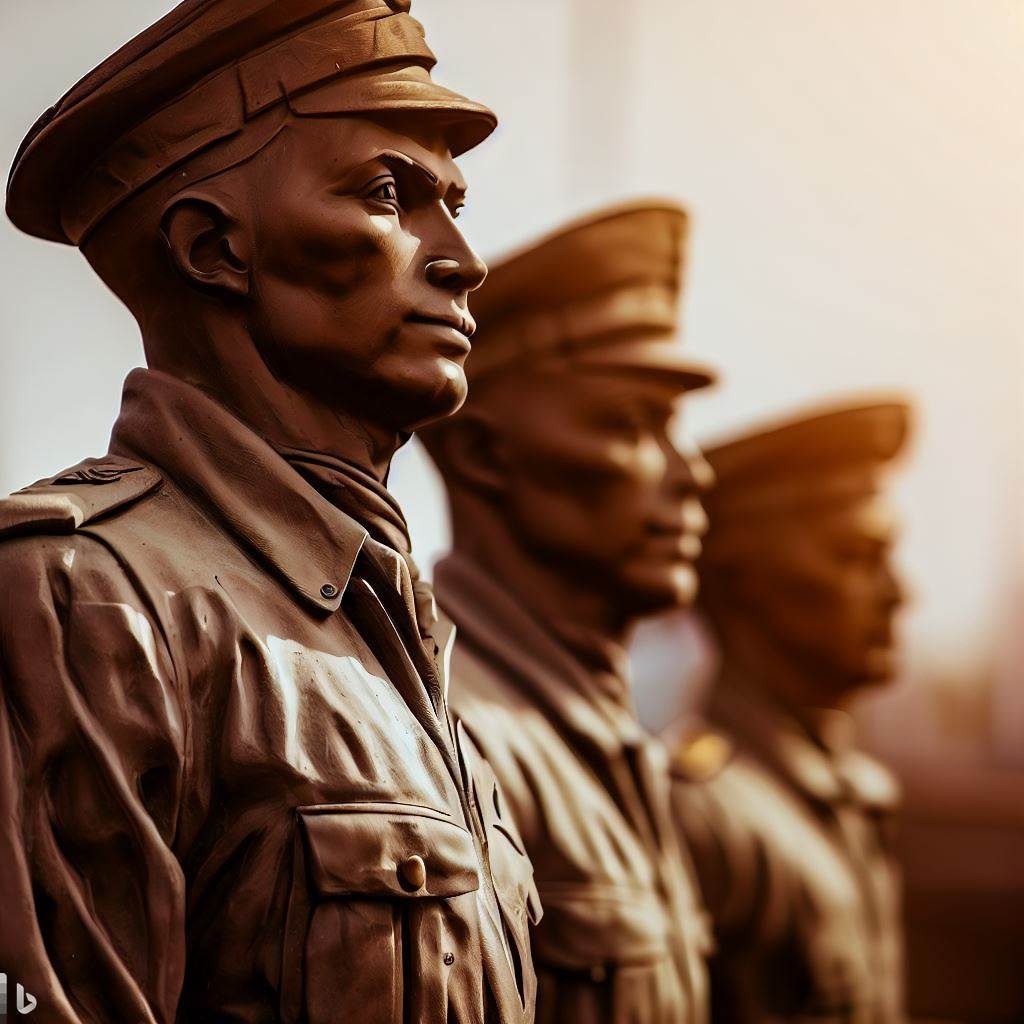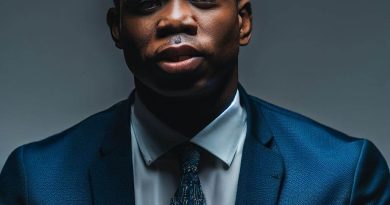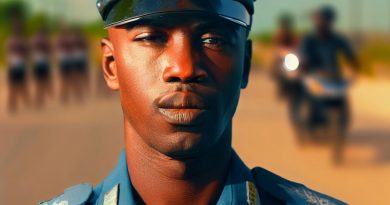Profiles of Heroes: Notable Nigerian Military Figures
Last Updated on August 12, 2023
Introduction
Nigeria, a country with a rich military history, has produced some notable military figures over the years.
These individuals have made significant contributions to the country’s military and played important roles in shaping Nigeria’s history.
It is essential to profile these heroes to honor their sacrifices and inspire future generations to follow in their footsteps.
These military figures’ achievements highlight the important role played by the military in preserving national identity. Their sacrifices and bravery ensure peace and stability today.
It is vital to recognize and appreciate their dedication and contributions to military development. Telling their stories allows us to learn, be inspired, and build on their legacies.
The following chapters will focus on notable Nigerian military figures, highlighting their significance in military history.
Read: Training Programs in the Nigerian Military Profession
Profiles of Notable Nigerian Military Heroes
- Murtala Muhammed: Murtala Muhammed, born in 1938, served as Nigeria’s fourth head of state from July 1975 to February 1976.
He played a crucial role in ending the Nigerian Civil War, reunifying the country, and establishing democracy. - Olusegun Obasanjo: A retired Nigerian Army General, Olusegun Obasanjo became Nigeria’s head of state from 1976 until 1979. He resumed as the head of state again from 1999 until 2007, serving two terms as a democratically-elected president.
His presidency is credited with implementing democratic and economic reforms that helped bring about stability and prosperity to Nigeria. - Hassan Usman Katsina: Hassan Usman Katsina was Nigeria’s first indigenous northern military officer to be commissioned in the Nigerian Army.
He was born in Katsina in 1923 and was one of the founding members of the Nigerian Army.
He served as Nigeria’s first Minister of Internal Affairs from 1960 to 1965, and he played a crucial role in laying the foundation of Nigeria’s national security policy.
Murtala Muhammed’s Accomplishments
- Played a key role in ending the Nigerian Civil War which led to the reunification of Nigeria.
- He was known for his strict anti-corruption policies and his efforts to streamline the government.
- He initiated the establishment of a new administrative capital for Nigeria – Abuja.
- Initiated the establishment of Nigeria’s first steel complex at Ajaokuta which would have transformed Nigeria’s industrial landscape had it been allowed to proceed fully.
Olusegun Obasanjo’s Accomplishments
- He introduced multiparty democratic elections in Nigeria and implemented economic and democratic reforms, improving living standards and attracting foreign investment.
- He played a key role in resolving conflicts in Liberia and Sierra Leone in the 1990s and brokered peace deals between warring factions in Angola and Cameroon.
- After retiring from politics, he became an international statesman, leading the African Union and other organizations, inspiring positive change in Africa.
Hassan Usman Katsina’s Accomplishments
- He participated in Nigeria’s first peacekeeping mission to the Republic of Congo in 1960.
- He became the first indigenous northern military officer commissioned into the army in 1953.
- As the country’s first Minister of Internal Affairs, he established essential government institutions.
Contribution to Nigeria’s History
- The contributions of Murtala Muhammed, Olusegun Obasanjo, and Hassan Usman Katsina to Nigeria’s history cannot be overstated.
- Muhammed’s initiative to establish Abuja as the new administrative capital of Nigeria has left a lasting legacy that continues to shape the country’s political and economic fortunes.
- Obasanjo’s efforts to bring about political and economic reforms have helped consolidate Nigeria’s democratic institutions and drive economic growth.
- Katsina’s role as Nigeria’s first Minister of Internal Affairs and his founding membership in the Nigerian Army were key steps in building Nigeria’s national security infrastructure and military capabilities.
Murtala Muhammed, Olusegun Obasanjo, and Hassan Usman Katsina shaped Nigeria’s history, leaving indelible marks on culture, society, and development.
Their accomplishments and contributions to national security, politics, and economics are notable. Their contributions are a testament to the power of leadership and the potential of Nigeria and its people.
Read: Corruption in the Nigerian Government: An Analysis
Challenges Faced by Nigerian Military Figures
Being a military figure in Nigeria is no easy feat. These brave men and women have faced numerous challenges and obstacles in their line of duty.
Let’s take a look at some of the challenges that military figures in Nigeria have faced and how these obstacles affected their leadership style.
Specific difficulties faced by Nigerian military heroes
- Lack of resources: Nigerian military figures have had to deal with inadequate resources and equipment, making it difficult for them to effectively carry out their duties.
- Insurgency: Boko Haram and other extremist groups have been a major challenge for Nigerian military figures, leading to loss of lives and a strain on resources.
- Corruption: Corruption has been a major issue in Nigeria’s military, with reports of embezzlement and diversion of funds meant for the military.
- Political interference: Politicians sometimes interfere with the military’s operations, causing a conflict of interest.
- Inter-tribal conflicts: Nigeria is a diverse country with several ethnic groups, and inter-tribal conflicts have sometimes affected military operations.
Effects of challenges on leadership style
Despite these obstacles, Nigerian military figures have demonstrated resilience and courage in the face of adversity. However, these challenges have also affected their leadership style in various ways.
- Adaptability: Military leaders have had to be quick to adjust to changing circumstances, especially in their fight against insurgency.
- Resourcefulness: Due to a lack of resources, military leaders have had to be innovative in finding ways to overcome the challenges they face.
- Transparency: In response to corruption allegations, military leaders have had to adopt a more transparent approach to their operations.
- Communication skills: Political interference has highlighted the importance of effective communication with politicians and other stakeholders.
- Interpersonal skills: In dealing with inter-tribal conflicts, military leaders have had to be skilled in conflict resolution and negotiation.
Despite the numerous challenges faced by Nigerian military figures, they have remained committed to protecting the country and its citizens.
Their bravery and sacrifice have not gone unnoticed, and they continue to inspire many Nigerians to this day.
In summary, Nigerian military figures have faced numerous challenges in carrying out their duties, including a lack of resources, insurgency, corruption, political interference, and inter-tribal conflicts.
These challenges have affected their leadership style in various ways, including adaptability, resourcefulness, transparency, communication skills, and interpersonal skills.
Despite these challenges, these military heroes have remained committed to their duty, protecting the sovereignty of Nigeria and its citizens.
Read: Decoding the Recruitment Process in the Nigerian Military

Lessons to be Learned from Nigerian Military Figures
Some of the most notable military figures in history were produced by the Nigerian military.
They played pivotal roles in shaping Nigeria’s political and military landscape, leaving a legacy of leadership lessons that can inspire modern-day leaders to lead with vision, courage, and decisiveness.
Below are some leadership lessons that we can learn from these Nigerian military figures:
1. Visionary leadership
One of the key attributes of notable Nigerian military figures is their vision and passion for a better Nigeria.
They saw beyond the challenges of their time and imagined a prosperous and united Nigeria.
For instance, General Yakubu Gowon played a critical role in uniting Nigeria after the civil war by promoting policies aimed at national integration.
His vision and leadership helped to restore peace and stability in Nigeria.
2. Courage and bravery
Notable Nigerian military figures demonstrated courage and bravery, defending Nigeria’s integrity and sovereignty against external threats.
For example, Major General Aguiyi Ironsi displayed exceptional bravery during the January 1966 coup, leading to his eventual death.
3. Strategizing and planning
Effective strategizing and planning are critical to achieving success in any undertaking.
Notable Nigerian military figures had the ability to formulate and execute strategic plans that enabled them to achieve their objectives.
Nigeria’s former military head of state, General Olusegun Obasanjo, successfully implemented the “Green Revolution” program, aiming for food self-sufficiency.
Read: Top 10 Highest Paying Professions in Nigeria: 2023 Edition
4. Adaptability and flexibility
Notable Nigerian military figures were also adaptable and flexible in their leadership approaches.
They possessed the ability to adjust their leadership style to suit the demands of different situations.
General Ibrahim Babangida’s flexible leadership style navigated Nigeria through a turbulent period with economic and political upheavals.
5. Decisiveness
Decisiveness is another key leadership trait that can be learned from notable Nigerian military figures.
They had the ability to make tough decisions when necessary, even in difficult circumstances.
For instance, Nigeria’s former military head of state, General Sani Abacha, made tough decisions critical to maintaining stability and sovereignty.
6. Selflessness and integrity
Their focus on Nigeria’s welfare earned them respect, like Lt. Colonel Murtala Muhammed’s stance on corruption.
Nigerian military figures’ leadership lessons inspire modern leaders with vision, courage, and adaptability.
Read: The Role of the Military in Nigerian Peacekeeping Missions
Conclusion
After profiling some of the notable Nigerian military figures, we can see how their contributions shaped Nigeria’s history and development.
These heroes have demonstrated bravery, courage, and patriotism, serving as role models to generations of Nigerians.
Learning about their stories gives us a deeper appreciation for the sacrifices of Nigerian servicemen.
As we celebrate their legacies, let’s remember the military’s challenges and support their efforts. Readers, continue learning about Nigeria’s military history and its heroic fighters.
Remember, these are not just stories; they represent the lives of real people who made significant contributions to our country.
Let us honor their sacrifices and work towards building a better Nigeria.


